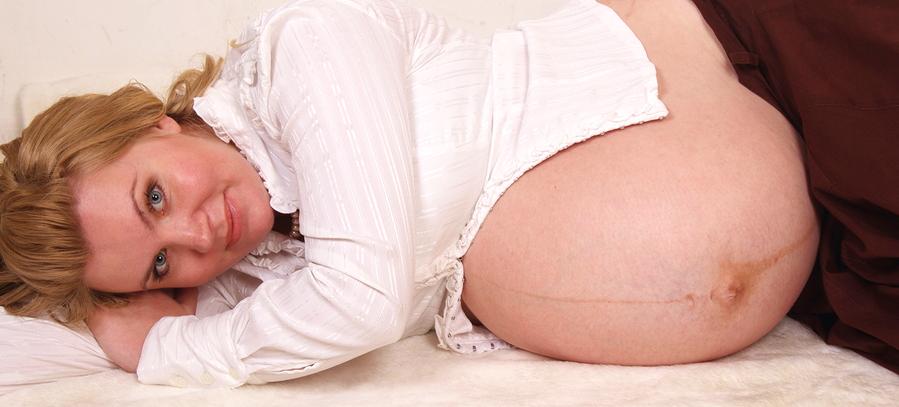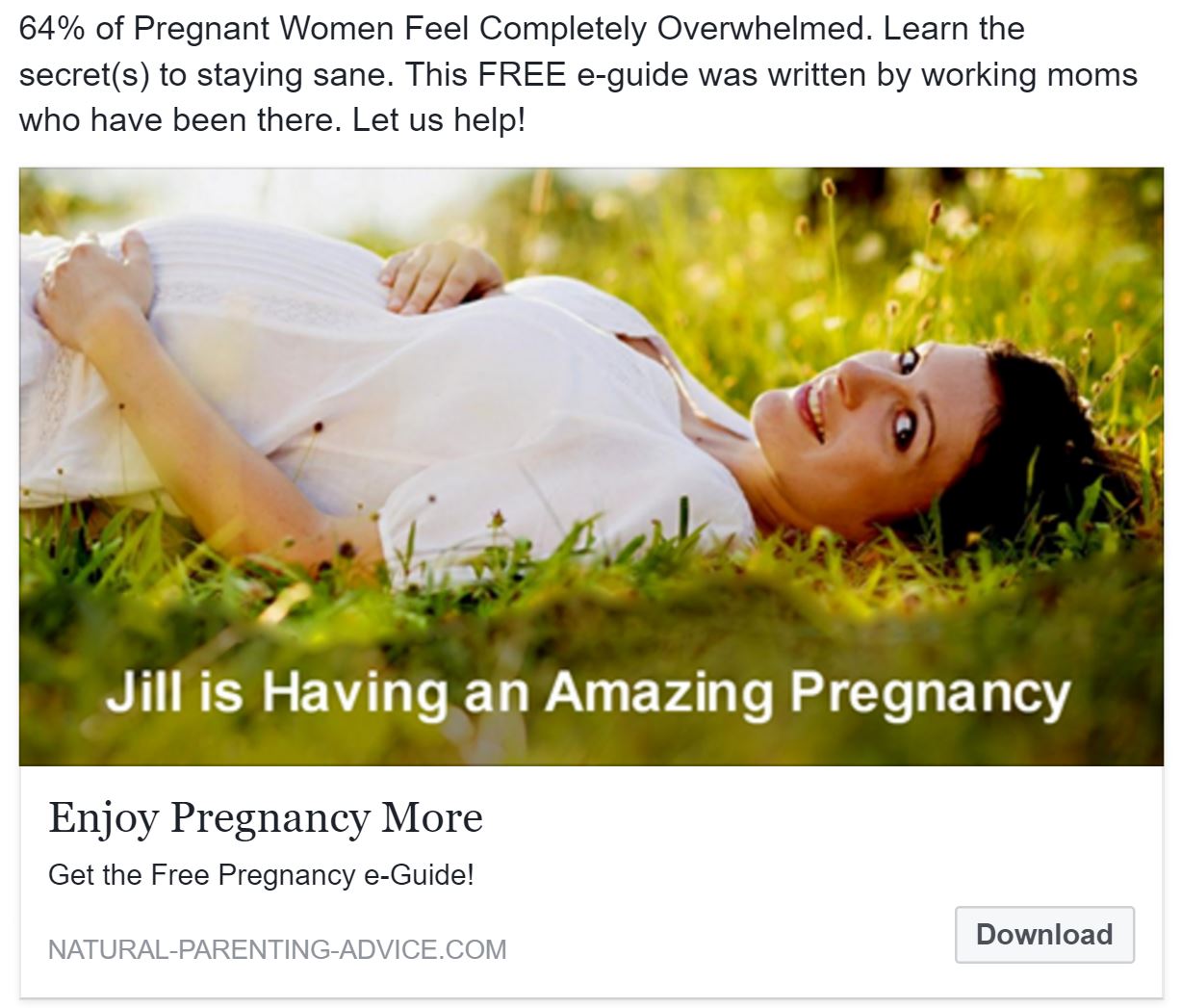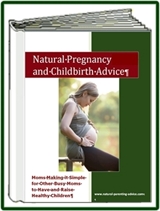Pregnancy Trimester - Third

Let's talk about pregnancy trimester number three. During your
third trimester of pregnancy at around eight months, your baby will be around six pounds and
between 18 and 20 inches long. At this point, your baby's grown and developed,
causing your intestine, stomach and lungs to feel the added pressure. Between
eight and nine months, this becomes more intense as your baby puts on weight
and does its final development.
The last
month of pregnancy is really the month in which your baby is preparing to be
born. Everything has developed to that point except, in some cases, for the
final maturation of the lungs. The main thing that your baby is doing is
putting on weight in preparation of being born; your baby will be born with a
week's worth of reserves. It can actually develop a nice intestinal flora over
the first week after birth by receiving colostrum from you through nursing
before your milk comes in. We discuss colostrum at length in our childbirth
class and breastfeeding classes.
Definitely watch our breastfeeding and childbirth class videos as well as
consider getting our e-book, The Natural
Pregnancy and Childbirth Advice E-book, because that includes a lot of
information about what happens with your baby's development.
To give you an overview, between eight and nine months, your baby is putting on another couple pounds and growing the last little bit. On average, babies are usually 18 to 20 inches long at eight months. By the time they are full term, they are typically between 20 and 21 inches long.
This growth puts a terrific amount of pressure on your lungs, intestines and
stomach. As you approach full term, your baby is going to drop or engage in
your pelvis. The pressure now will be less up in your lung area but greater
down on top of your bladder and down in your pelvis. Remember all those trips
to the bathroom that happened during your first trimester of pregnancy? Well,
in your third pregnancy trimester, you return to needing to use the bathroom more, especially
the last month or so, because your baby's putting a terrific amount of pressure
on your bladder, and it just doesn't have room to store a lot of urine.
Get all of our best pregnancy tips. Download our free e-guide today!
The third pregnancy trimester usually brings on the most complaints about discomfort from my pregnant students, because you really start feeling very unwieldy, and it's hard to move around. Picture a hard basketball in your abdomen area that you're having to bend over. Oftentimes, you don't get to see your toes and haven't for several weeks.
At the same time, your hormones ramp up in preparation for birth to prepare your body as well as the baby’s body, making it a lot harder to think. The fuzzy thinking kicks in again, as the hormone relaxin works to relax the tendons and ligaments in your body, giving you a “loosey goosey” feeling that causes aches and pains.
It's much easier to trip and stumble during this time because your center of gravity has changed due to the growth of the baby, making it hard for you to move around. You want to make sure that you enjoy every bit of this process and really let your body go through all the hormonal processes that it needs to prepare for childbirth. It is important for your body and your baby to be fully prepared for a good birth experience.
WHY YOU WANT YOUR BABY TO BE FULL-TERM WHEN BORN
Many people don't realize that it's actually the baby that triggers labor by releasing hormones. It's very important to give your baby the chance to release the hormones and signal that it's ready to be born. Your third pregnancy trimester is when your baby gets ready to be born.
In our society, there's this notion that a normal pregnancy is 40 weeks long. However, if you look at the research and the statistics, historically a lot of women worked under a lot of stress and in a much more sedentary lifestyle. But if you eliminate the last 80 years and look at the statistics, the average length of gestation is really 41 and one-seventh weeks long. That's 41 weeks and one day, with the normal range being between 36 and 44 weeks. You can look on our site; we have links to the statistics that bear this out.
What that means is our medical profession views 40 weeks as a normal length of pregnancy. Oftentimes, a tremendous amount of pressure is put on women to be induced if they go over 40 weeks or over 41 weeks, and this really creates a problem because induction causes what we call the “cascade of interventions,” which often will lead to a cesarean birth or another kind of birth that is not natural and requires an epidural and other interventions.
This adds up to a situation that is much less healthy for both the mother and the baby. Certainly, the statistics bear out that cesarean section is much riskier for the mother and the mortality rate increases; it is also riskier for baby.
It is important to remember that your third pregnancy trimester, in the span of a lifetime, is only three months; it is like the blink of an eye.
A WARNING ABOUT TAKING ANY MEDICATION DURING PREGNANCY - Regardless of Pregnancy Trimester
I wanted to also talk about medication and drugs during pregnancy.
There's a common myth that says the placenta filters out things and protects your baby from the things that are circulating in your blood. We actually know that's not the case at all. Many things go across the placental barrier, such as medications, vaccinations, viruses, etc.
During pregnancy, say you weigh 165 pounds and your baby weighs about seven pounds as you get close to full term. When you take medication, your baby can receive up to 20 times the effect of the medication that you're taking because you weigh 165 pounds but your baby only weighs about seven pounds and is getting the same concentration of the medicine that you're getting.
In reality, some drugs affect the baby more than the mother, and some drugs affect the baby less than the mother. It really depends on the medication and its ability to pass through the placental barrier.
BE CAREFUL BECAUSE EVERYTHING THAT YOU TAKE CAN AFFECT YOUR BABY DURING PREGNANCY.
Certainly you wouldn't want to do any street drugs and you don't want to take any prescription drugs, if at all possible, which is one of the reasons why we mentioned NeilMed Sinus Rinses. For many women, they're able to eliminate having to take any kind of allergy medicine for hay fever and sinuses by simply doing a sinus rinse first thing in the morning and last thing at night.
Another thing to know regardless of your pregnancy trimester about the herb stinging nettle. Freeze dried stinging nettle is very helpful. Taking some stinging nettle or making stinging nettle tea combined with doing a NeilMed Sinus Rinse has actually solved the problem of allergies for many of my pregnant students, and not only during pregnancy, but after pregnancy as well - while they're breastfeeding and beyond. They've been able to eliminate having to take allergy medicine at all, which is wonderful because allergy medicine almost always causes drowsiness. If you can do away with having to take allergy medicine, it can be a really wonderful thing.
A lot of natural drugs, such as teas, herbs, food additives, as well as household chemicals, and other environmental hazards, can pass through to your baby as well. That's the reason why we keep emphasizing eating an organic diet and eliminating your exposure to any kind of pesticides, cleaning agents, and any other kind of toxins while you're pregnant.
Need to Talk To Someone?
Do be very specific or personal questions you do not feel comfortable discussing in public forums? If so, please meet signing up for a 60 minute mentoring session.
Pregnancy & Childbirth Mentoring
You will be amazed at the Amount of information and can gain confidence in just a few minutes of one-on-one help.












New! Facebook Comments
Tell us what you think!